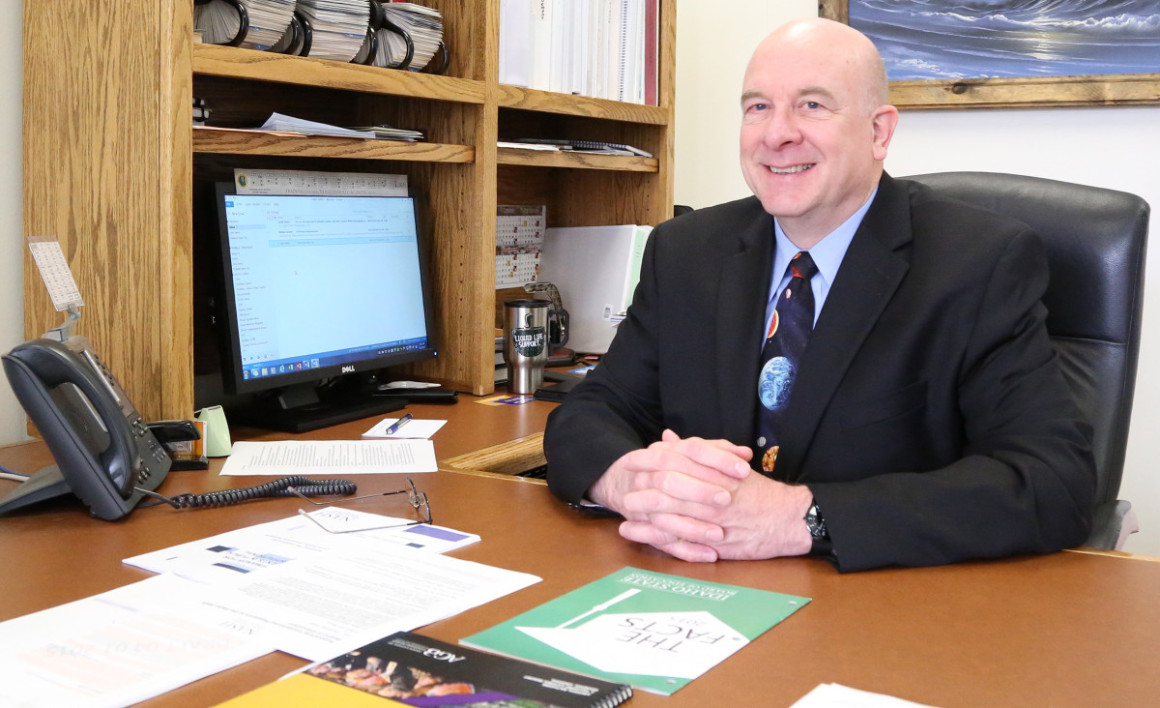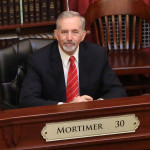Mike Rush described himself as an “imposter” during a recent staff meeting. Eight years ago, he was appointed the State Board of Education’s executive director on an interim basis — but he stayed.
It’s probably more accurate to describe Rush as a fixture. The Idaho native has spent 29 years working with the State Board and its appointees. His last day is June 26. Three days later, Rush will take a job heading South Dakota’s Board of Regents.

Rush was the State Board’s administrative presence as a gubernatorial task force reached consensus on a far-reaching list of 20 education recommendations — and as stakeholders completed the contentious process of crafting a career ladder to boost teacher pay. Rush’s surprising departure leaves the State Board looking for a successor to help the state implement the career ladder and the task force’s recommendations.
Career path, career ladder
Rush has deep roots in education, and Idaho. In 1977, he started his career as a teacher at Buhl High School and he spent some time teaching at the University of Idaho. He also has family ties to Idaho education: His younger brother Wayne, precisely two years his junior, is superintendent in the Emmett School District.
In 1986, Rush was recruited away from a faculty job at Penn State University to return to Idaho and work with the State Board.
He worked in the board’s professional-technical education division, rising to division chief in 1997. A decade later, he was promoted to the executive director’s post.
The State Board’s mission encompasses K-12 and higher education — and for the past couple of years, Rush has played a prominent role in a defining debate over the state’s public school system.
After voters rejected Propositions 1, 2 and 3 in November 2012, Gov. Butch Otter assigned the State Board to convene a task force to examine the K-12 system. Rush was skeptical at first, concerned that the group would “rehash grievances” from the bitter 2012 election. It was important, he said, that Otter and the State Board both envisioned an all-inclusive group. “We weren’t going to exclude any viewpoints,” he said.
By August 2013, the 31-member group agreed on a list of 20 recommendations that covered everything from Common Core to classroom technology to teacher pay. Each recommendation, save for Common Core, received unanimous support.
Then came implementation, and the difficult debate over what a teacher pay plan should look like. This put Rush at the forefront. In October 2014, he moderated a statewide series of board public hearings, as teacher after teacher criticized the board’s plans to tie pay raises to a tiered teacher licensure plan.
IEA president Penni Cyr says her group didn’t see eye-to-eye with Rush on the tiered licensure issue, but she also gives him high marks for his body of work. “We have the highest respect for Mike and his years of service to public schools in Idaho.”

The tiered licensure debate was heated, and Rush said it wasn’t easy to listen to the criticism. But the criticisms did reflect the fact that Idahoans were passionate about the issue — and weren’t willing to let it die. “I always felt that we were going to get to the end.”
Still, getting to that finish line proved to be a circuitous process. After weeks of closed-door meetings, and two bills that went nowhere, a third version of the career ladder finally wound up passing the Legislature. “Mike Rush did a wonderful job of facilitating and keeping people at the table,” said Sen. Janie Ward-Engelking, a Boise Democrat and retired teacher.
Where policy meets politics
By its design, the executive director sits at the juncture between administration of education policy — and the politics that forever swirls around the education debate. Rush’s education credentials include a doctorate from Virginia Tech. But the job requires a touch for working with elected officials, such as the governor, the superintendent of public instruction and legislators.
Then there’s the matter of working with, and for, the State Board, a political body that includes the state superintendent and seven gubernatorial appointees. The executive director works at the pleasure of the board.
“You just need a really strong skill set,” said Rob Winslow, executive director of the Idaho Association of School Administrators. “That board is made up of very bright, strong people.”

State Board president Emma Atchley praises Rush for his three decades of leadership in Idaho education. Rush, in turn, says he has had a good working relationship with the board, and praises Otter’s appointments to the panel.
Rush sees the need for board staff and board appointees to work in concert. An experienced staff gives the board continuity, and that frees up the board to focus on big-picture policy goals.
That includes the State Board’s biggest goal: boosting postsecondary graduation rates to 60 percent by 2020, from 42 percent in 2014. The 60 percent goal was the guiding principle behind the task force recommendations and remains the board’s focus — even though it’s an ambitious goal that may not be achieved during individual board members’ time on the panel. “I think they’ve been exceptionally true to that vision,” Rush said. “They haven’t given up on that.”
The graduation numbers are improving. Still, Rush thinks everyday Idahoans need to embrace the importance of this issue. Where he saw passion surrounding the teacher pay debate, he senses less passion about the value of postsecondary education.
A fast-track hire?
It’s up to the State Board to find a successor to Rush.
“Gov. Otter has encouraged the Board to apply a robust process for filling this position,” Otter spokesman Mark Warbis said this week.
But the board sets the parameters for the hiring process — and the board has put the process on the fast track. The application period opened May 27 and closes Friday.

That timetable surprised Winslow, and suggests the board may already have a candidate in mind. Senate Education Committee Chairman Dean Mortimer, R-Idaho Falls, hopes the board will explore in-state and out-of-state options, and isn’t sure a two-week application window will facilitate that. “To me, it should be longer.”
The fact that there is an opening at all surprises observers. Mortimer doesn’t read anything into Rush’s decision. Rush may be at a stage in his career where he is looking to take on “one more significant challenge,” Mortimer said.
The challenges are different. South Dakota’s Board of Regents deals only with higher education, which will give Rush the chance to specialize.
Rush, 59, said he had gotten “rather comfortable” in the Idaho job, so he thought it was important to make a change. Jobs of this type tend to have a short shelf life, since it requires an administrator to confront a steady stream of problems.
“It’s just not as fun to solve (problems) the second time,” he said.
